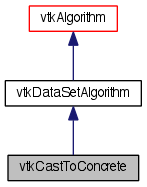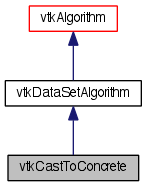works around type-checking limitations More...
#include <vtkCastToConcrete.h>


Public Types | |
| typedef vtkDataSetAlgorithm | Superclass |
Public Member Functions | |
| virtual int | IsA (const char *type) |
| vtkCastToConcrete * | NewInstance () const |
| void | PrintSelf (ostream &os, vtkIndent indent) |
Static Public Member Functions | |
| static vtkCastToConcrete * | New () |
| static int | IsTypeOf (const char *type) |
| static vtkCastToConcrete * | SafeDownCast (vtkObjectBase *o) |
Protected Member Functions | |
| virtual vtkObjectBase * | NewInstanceInternal () const |
| vtkCastToConcrete () | |
| ~vtkCastToConcrete () | |
| virtual int | RequestData (vtkInformation *, vtkInformationVector **, vtkInformationVector *) |
| virtual int | RequestInformation (vtkInformation *, vtkInformationVector **, vtkInformationVector *) |
Detailed Description
works around type-checking limitations
vtkCastToConcrete is a filter that works around type-checking limitations in the filter classes. Some filters generate abstract types on output, and cannot be connected to the input of filters requiring a concrete input type. For example, vtkElevationFilter generates vtkDataSet for output, and cannot be connected to vtkDecimate, because vtkDecimate requires vtkPolyData as input. This is true even though (in this example) the input to vtkElevationFilter is of type vtkPolyData, and you know the output of vtkElevationFilter is the same type as its input.
vtkCastToConcrete performs run-time checking to insure that output type is of the right type. An error message will result if you try to cast an input type improperly. Otherwise, the filter performs the appropriate cast and returns the data.
- Warning:
- You must specify the input before you can get the output. Otherwise an error results.
- See also:
- vtkDataSetAlgorithm vtkPointSetToPointSetFilter
- Examples:
- vtkCastToConcrete (Examples)
Definition at line 52 of file vtkCastToConcrete.h.
Member Typedef Documentation
Reimplemented from vtkDataSetAlgorithm.
Definition at line 57 of file vtkCastToConcrete.h.
Constructor & Destructor Documentation
| vtkCastToConcrete::vtkCastToConcrete | ( | ) | [inline, protected] |
Definition at line 61 of file vtkCastToConcrete.h.
| vtkCastToConcrete::~vtkCastToConcrete | ( | ) | [inline, protected] |
Definition at line 62 of file vtkCastToConcrete.h.
Member Function Documentation
| static vtkCastToConcrete* vtkCastToConcrete::New | ( | ) | [static] |
Create an object with Debug turned off, modified time initialized to zero, and reference counting on.
Reimplemented from vtkDataSetAlgorithm.
| static int vtkCastToConcrete::IsTypeOf | ( | const char * | name | ) | [static] |
Return 1 if this class type is the same type of (or a subclass of) the named class. Returns 0 otherwise. This method works in combination with vtkTypeMacro found in vtkSetGet.h.
Reimplemented from vtkDataSetAlgorithm.
| virtual int vtkCastToConcrete::IsA | ( | const char * | name | ) | [virtual] |
Return 1 if this class is the same type of (or a subclass of) the named class. Returns 0 otherwise. This method works in combination with vtkTypeMacro found in vtkSetGet.h.
Reimplemented from vtkDataSetAlgorithm.
| static vtkCastToConcrete* vtkCastToConcrete::SafeDownCast | ( | vtkObjectBase * | o | ) | [static] |
Reimplemented from vtkDataSetAlgorithm.
| virtual vtkObjectBase* vtkCastToConcrete::NewInstanceInternal | ( | ) | const [protected, virtual] |
Reimplemented from vtkDataSetAlgorithm.
| vtkCastToConcrete* vtkCastToConcrete::NewInstance | ( | ) | const |
Reimplemented from vtkDataSetAlgorithm.
| void vtkCastToConcrete::PrintSelf | ( | ostream & | os, |
| vtkIndent | indent | ||
| ) | [virtual] |
Methods invoked by print to print information about the object including superclasses. Typically not called by the user (use Print() instead) but used in the hierarchical print process to combine the output of several classes.
Reimplemented from vtkDataSetAlgorithm.
| virtual int vtkCastToConcrete::RequestData | ( | vtkInformation * | , |
| vtkInformationVector ** | , | ||
| vtkInformationVector * | |||
| ) | [protected, virtual] |
This is called within ProcessRequest when a request asks the algorithm to do its work. This is the method you should override to do whatever the algorithm is designed to do. This happens during the fourth pass in the pipeline execution process.
Reimplemented from vtkDataSetAlgorithm.
| virtual int vtkCastToConcrete::RequestInformation | ( | vtkInformation * | , |
| vtkInformationVector ** | , | ||
| vtkInformationVector * | |||
| ) | [protected, virtual] |
This is called within ProcessRequest when a request asks for Information. Typically an algorithm provides whatever lightweight information about its output that it can here without doing any lengthy computations. This happens in the first pass of the pipeline execution.
Reimplemented from vtkDataSetAlgorithm.
The documentation for this class was generated from the following file:
- dox/Common/ExecutionModel/vtkCastToConcrete.h
 1.8.0
1.8.0